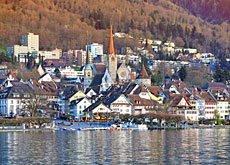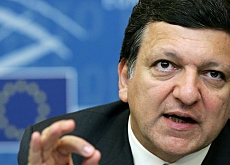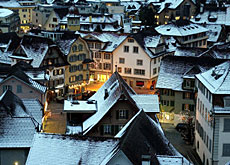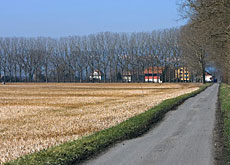Switzerland losing corporate tax advantage in Europe

A report on corporate tax rates warns that Switzerland could become less attractive to top firms.
Stiff competition from Ireland and eastern European countries coupled with a European Union attack on the Swiss tax system could undermine Switzerland’s reputation.
The report by tax specialists KPMG shows that Switzerland as a whole occupies a mid-table position in the corporate tax league. But several Swiss cantons, which can set their own rates, are competing well despite a dramatic fall in business taxation across the world in recent years.
Nearly half of the 26 cantonal economic agencies surveyed believe the position will worsen in future and a further third think Switzerland will do no more than hold its ground.
KPMG partner Olivier Gehriger told swissinfo that a current conflict with the EU is behind the pessimistic thinking. Last year its governing body, the European Commission, accused cantons of violating the 1972 Free Trade Act and the dispute rumbles on.
“This is a typical example of the kind of way the EU is trying to pressure Switzerland into changing its tax system. Some people think that the only way to ease this pressure is to join the EU,” he said.
Gehriger added that prohibitive costs and regulations also deter firms from setting up large factories. Last year the world’s largest biotech company, Amgen, snubbed Switzerland in favour of Ireland for the location of a large production plant.
The survey of 86 countries around the world shows that corporate tax rates have fallen by 12 per cent since 1993 to an average of 27.1 per cent.
In Switzerland, companies are levied at federal, cantonal and communal level, with the latter two authorities free to set their own charges.
Leaders
The average rate across the country is 21.3 per cent, down from around 28 per cent in 1993, but the cost to businesses in cantons like Obwalden, Zug, Nidwalden and Appenzell Inner Rhodes is much lower.
At the beginning of this year Obwalden slashed its business levy to 6.6 per cent. Combined taxes at all three levels amount to 13.1 per cent, the lowest in Switzerland.
One advantage Switzerland has over some of its main challengers in eastern Europe is an established infrastructure. Firms also look for stable government, good transport links, a well skilled workforce and excellent education when choosing a foreign location.
“Corporate tax competition cannot simply be a race to the bottom. It has to be accompanied by investment, stability, spending efficiency and development of other sources of revenue such as indirect taxes,” Gehriger said.
swissinfo, Matthew Allen
Selected business tax rates:
Japan 40.7%, US 40%, Germany 38.3%, Switzerland 21.3%, Republic of Ireland 12.5%, Cyprus 10%
Selected cantonal rates:
Obwalden 13.1%, Schwyz 15.6%, Zug 16.4%, Zurich 21.3%, Graubünden 29.1%
Britain is credited with starting the modern trend of corporate tax competition by slashing its levy from 52% to 35% between 1982-1986, forcing other countries to follow suit. That rate has since dropped to 30% – ironically one of the higher tax regimes of the countries surveyed.
This competition has intensified in recent years with the Irish Republic cutting its rate from 40% in 1993 to the current 12.5%. The 68.8% reduction is the largest in this period. Many eastern European countries have recently also made big reductions.
The European Commission first raised the issue of Swiss cantonal tax competition in September 2005. The EC believes such competition breaks the terms of the Free Trade Agreement it signed with Switzerland in 1972. Despite several meetings with the Swiss authorities, an agreement has yet been reached.
KPMG International is a global network of firms providing audit, tax and advisory services.
It is represented in 144 countries around the world and has a 104,000 employees, including 1,470 in Switzerland.
KPMG Switzerland posted sales of SFr367 million in 2005, up 12.9% on the previous year.

In compliance with the JTI standards
More: SWI swissinfo.ch certified by the Journalism Trust Initiative




You can find an overview of ongoing debates with our journalists here. Please join us!
If you want to start a conversation about a topic raised in this article or want to report factual errors, email us at english@swissinfo.ch.